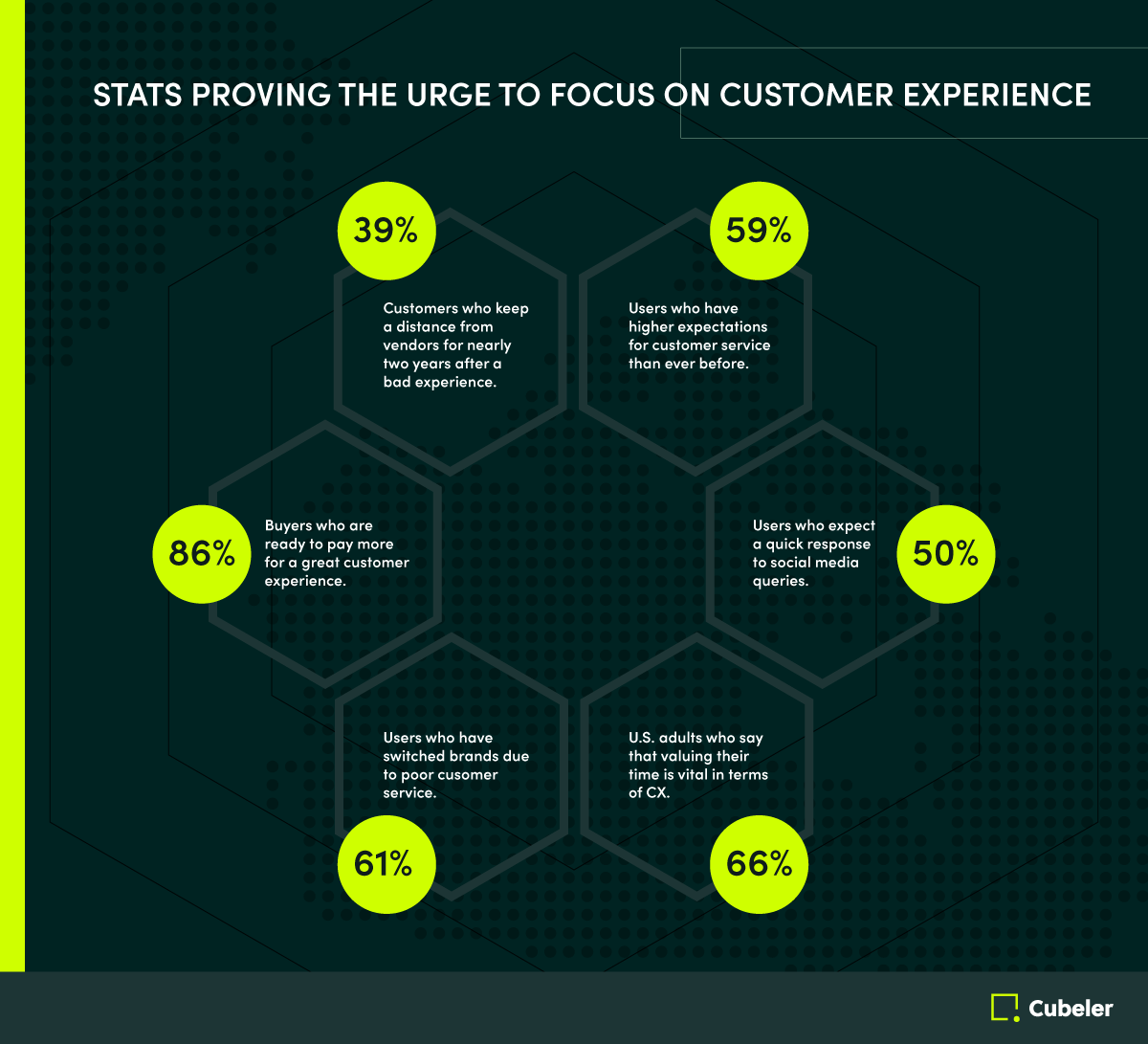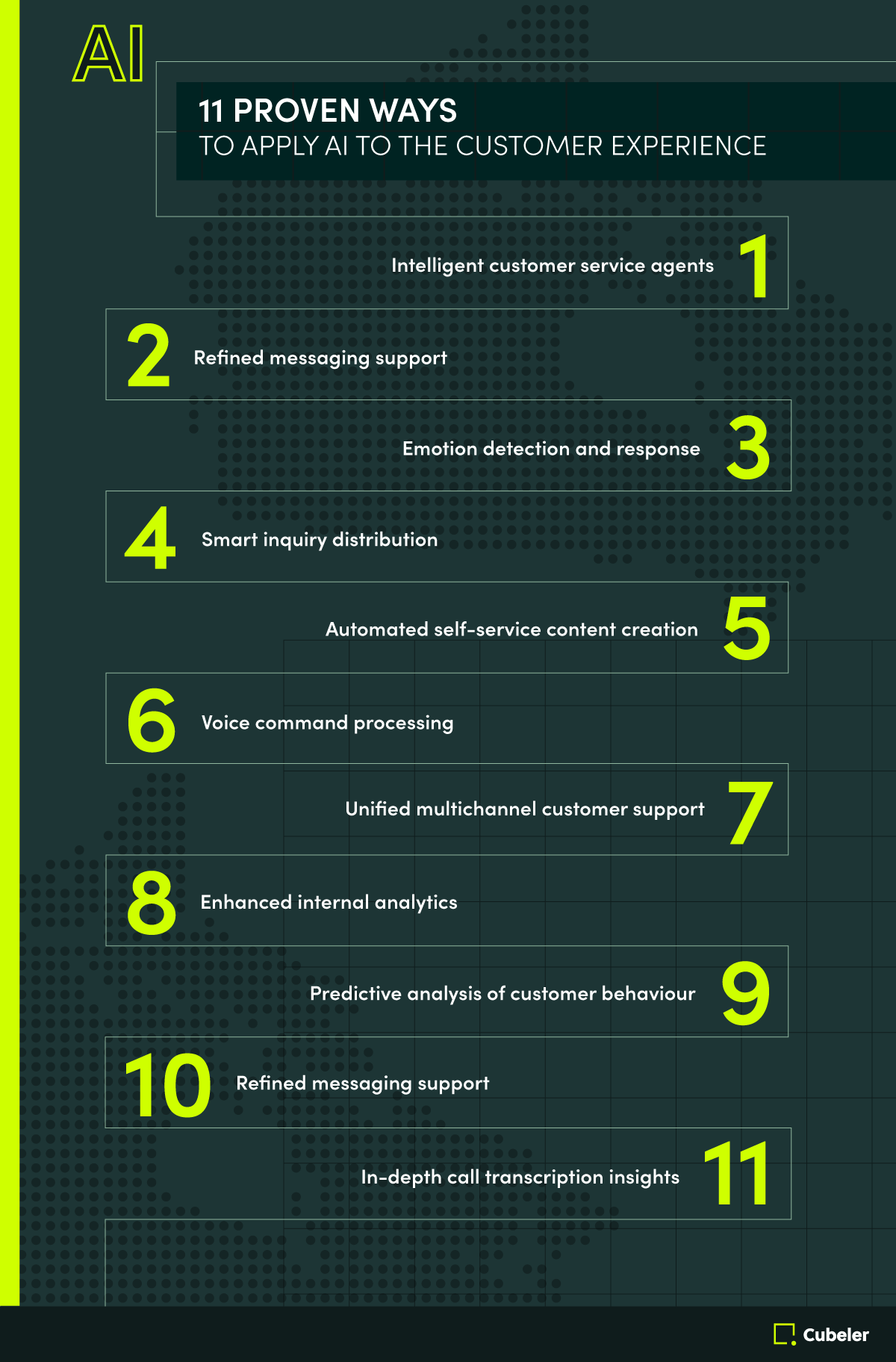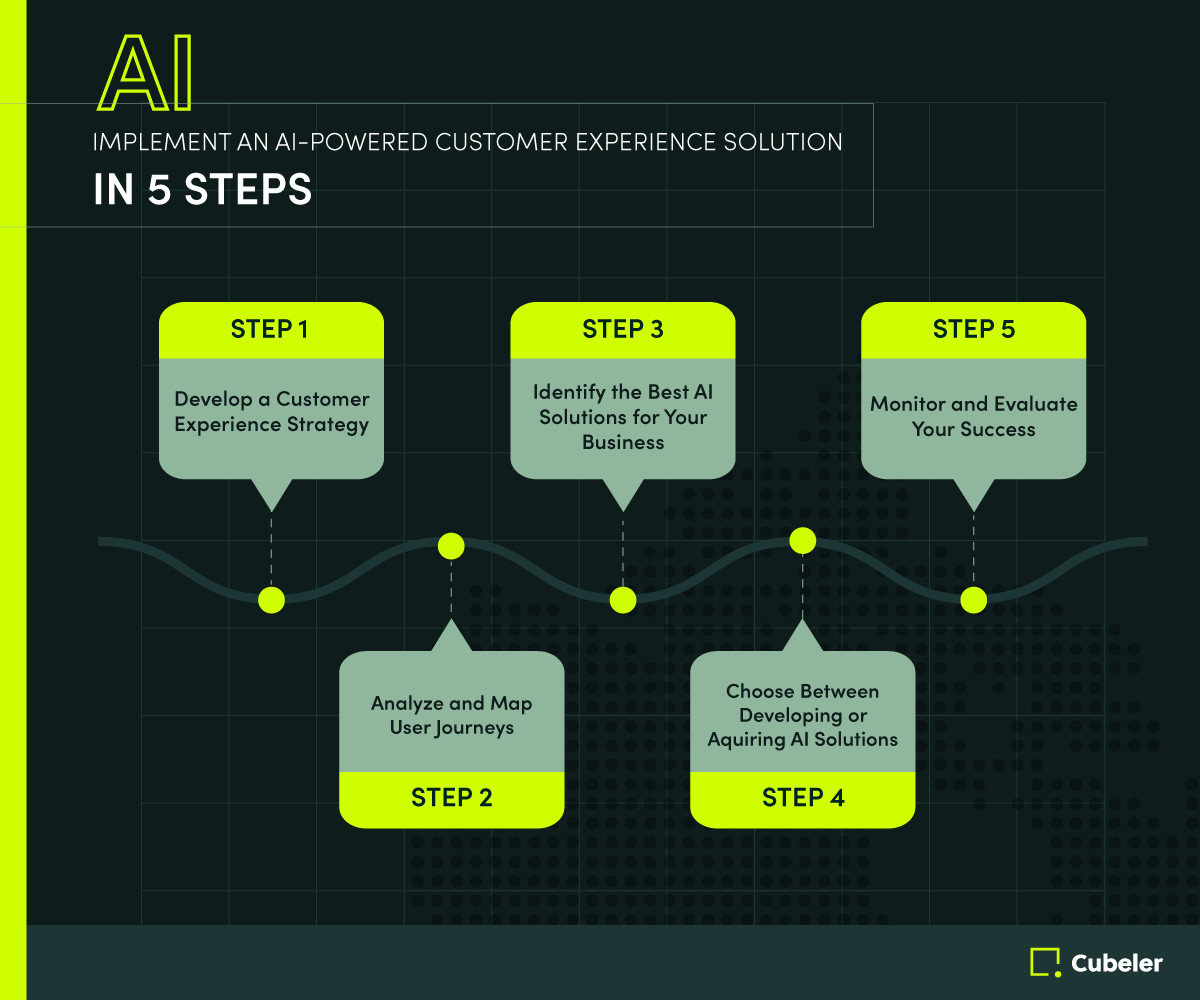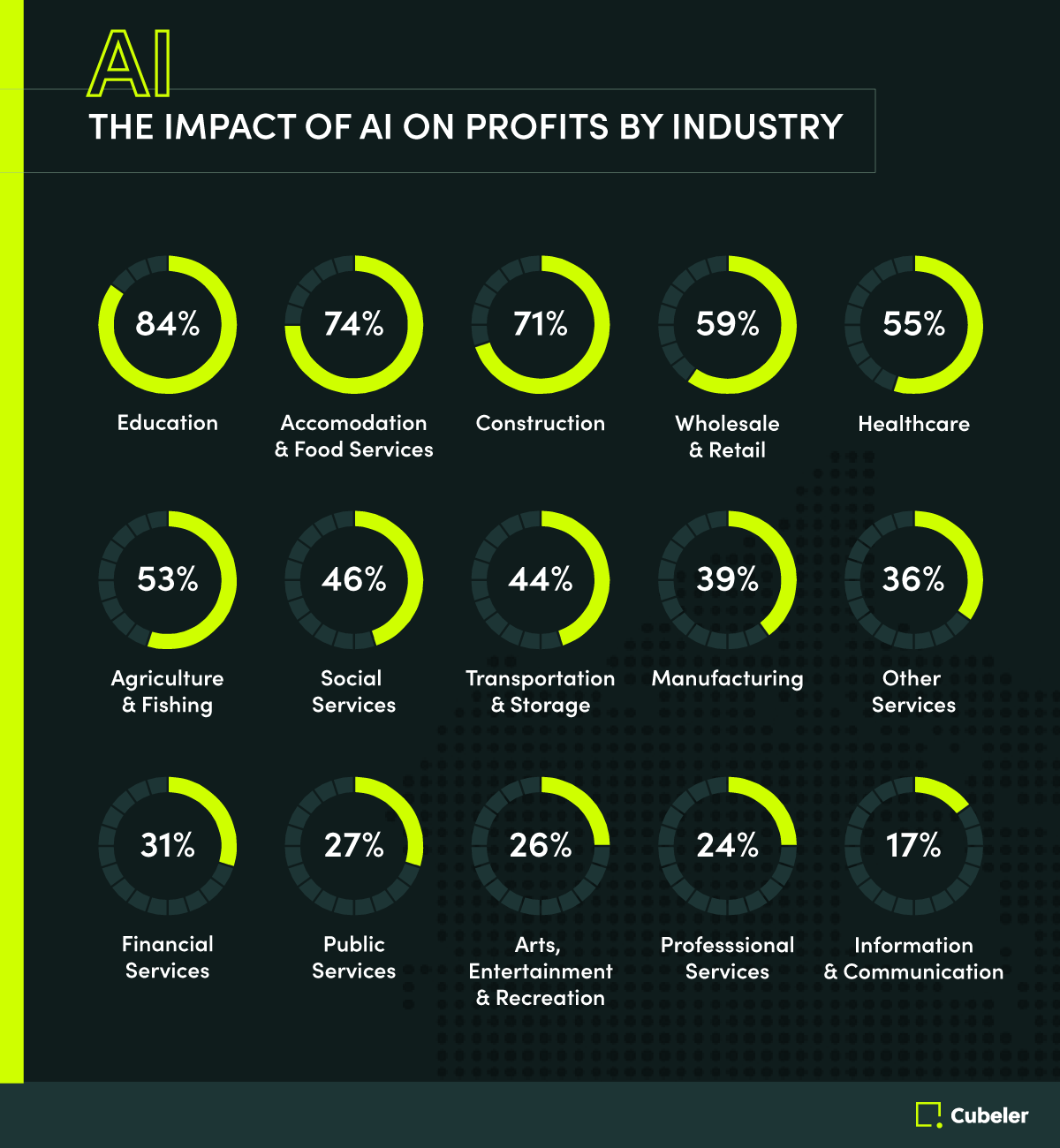Top 10 Digital Transformation Fails—and How to Sidestep Them
Discover how to sidestep the top 10 digital transformation fails with a step-by-step plan to integrate the right...
10 min read
By:
Cubeler en-ca
12-Feb-2024 6:06:03 PM

Leverage AI to optimize the customer experience and remain competitive.
In the digital age, the battleground for customer loyalty has shifted significantly. Businesses no longer compete solely on product or price—the customer experience (CX) has emerged as the new frontier for competitive differentiation.
This shift is particularly pertinent for small and medium-sized enterprises (SMEs) that might lack the extensive resources of larger corporations but must be more agile and customer-focused.
Enter artificial intelligence (AI), a transformative force capable of reshaping customer interactions, making them more personalized, efficient and engaging.
AI’s role in enhancing customer experience is no longer a privilege reserved for tech giants. It's increasingly accessible to SMEs, offering them a pathway to level the playing field.
By leveraging AI, small and medium-sized companies can analyze customer data more effectively, predict customer behaviour and tailor customer interactions to meet individual needs.
For many SMEs, though, the thought of navigating the world of AI can be a little overwhelming. You may feel the same way. Good news. We’ve got your back.
Here, we illustrate how you, as a small or medium-sized business owner or manager, can harness the power of AI to optimize the customer experience and remain competitive in today’s ever-changing market landscape.

Source: Appinventiv, October 2023
Understanding the synergy between artificial AI and CX is pivotal for businesses aiming to thrive in today's digital-first marketplace.
AI, in the context of customer experience, refers to the use of intelligent technologies that simulate human intelligence to enhance and personalize interactions between businesses and their customers.
When it comes to CX, the use of AI encompasses a broad spectrum of applications, from chatbots providing instant customer support to machine learning algorithms predicting future buying behaviour.
The value of AI in comprehensively understanding customer behaviour and preferences cannot be overstated. Traditional methods of customer data analysis often fall short in deciphering the vast and complex web of consumer interactions across various digital platforms.
AI steps into this gap with remarkable efficiency, sifting through large datasets to identify patterns, trends and insights that would be impossible for humans to uncover in a timely manner.
AI enables businesses to gain a deeper understanding of their customer base, simplifying the delivery of highly personalized experiences that resonate on an individual level.
AI-driven, personalized customer experiences are not just about addressing your customers by name in an email. They are also about tailoring the shopping experience and recommending products or services based on past purchases, browsing behaviour, and even social media interactions.
AI’s ability to analyze data, learn from interactions and predict consumer behavior has opened new avenues for businesses to connect with their customers in more personalized, efficient and insightful ways.
Let’s explore how AI is redefining customer experience across key areas, ensuring businesses not only meet but exceed customer expectations.
Personalization
At the heart of AI’s impact on customer experience is personalization. In an era where consumers are bombarded with countless choices, the ability to stand out by offering tailored experiences can significantly sway customer loyalty.
AI leverages data from past interactions, purchases and social media activity to create a 360-degree view of the customer. This comprehensive understanding allows businesses to customize their offerings, communications and services to match the unique preferences and needs of each customer.
E-commerce platforms, for example, use AI to suggest products that a customer is more likely to purchase based on their browsing history and buying behavior. A case in point: a customer who frequently browses outdoor gear on a retailer's site might receive personalized recommendations for camping equipment, accompanied by a tailored discount, right at the start of the camping season.
This level of individualization makes customers feel understood and valued, fostering a deeper connection with the brand.
Customer Support
AI-powered chatbots and virtual assistants are revolutionizing customer support by providing immediate, 24/7 assistance.
Unlike traditional customer service, which can be limited by human resource constraints and office hours, AI ensures that help is always available, reducing wait times and improving overall satisfaction.
AI-driven intelligent systems can handle a wide range of queries, from simple FAQs to more complex issues, and if needed, seamlessly escalate the matter to a human representative.
The constant availability and efficiency of AI-powered systems not only enhance the customer support experience but also optimize operational costs for businesses.
By automating routine inquiries via AI, companies can allocate human resources to more complex and value-added activities, thereby improving productivity and service quality.
Feedback and Insights
One of AI’s most transformative capabilities is its ability to provide real-time feedback and actionable insights.
By analyzing customer interactions and feedback across various channels, AI tools can identify patterns and trends that might indicate satisfaction levels, preferences and potential areas for improvement.
This continuous loop of feedback allows businesses to swiftly adapt and refine their offerings to better meet customer needs.
Plus, sentiment analysis tools, which automatically analyze text data to help you quickly understand how customers feel about your brand, product or service, can gauge the emotional tone behind customer reviews and social media mentions, offering deeper insights into the customer’s perception of the brand.
This level of understanding enables businesses to proactively address issues, tailor their communication strategies and build stronger relationships with their customers.
Here are 11 proven ways AI can significantly enhance and enrich the customer experience.

1. Intelligent customer service agents
These advanced, AI-driven agents transcend the capabilities of traditional chatbots, offering precise interpretations of customer inquiries and delivering comprehensive solutions around the clock. Such sophistication not only uplifts the customer service experience but also enhances the efficiency of service teams.
For instance, innovative AI technologies like HubSpot's ChatSpot, seamlessly integrated within CRM systems, enable service professionals to manage emails and generate custom reports through conversational interfaces, significantly boosting productivity.
2. Refined messaging support
This technology discerns when it’s crucial for human customer service agents to step in, especially for complex or sensitive issues. By combining AI’s speed and accuracy with the empathetic touch of human interaction, businesses can offer a well-rounded customer service experience.
This dual approach acknowledges AI’s limitations in replicating the full spectrum of human empathy, ensuring customers receive personalized care that genuinely understands their unique situations.
3. Emotion detection and response
Advanced AI tools, endowed with natural language processing abilities, can discern and react to the emotional tone of customer communications.
This capacity to recognize and adapt to a customer’s mood in real-time plays a key role in defusing potential conflicts, enriching the interaction quality.
Instruments like the tone detector from Grammarly are utilized to preemptively evaluate the emotional undertone of communications, enabling AI to adjust its responses to be more attuned and sensitive to the customer’s current emotional state.
4. Smart inquiry distribution
AI technologies adeptly categorize customer queries based on urgency and topic, directing them to the most suitable service agents.
To provide prompt and accurate responses, this intelligent routing ensures:
5. Automated self-service content creation
AI-driven writing assistants streamline the creation of a comprehensive self-help knowledge base, including FAQs, instructional articles and support documentation.
This automation enhances the accessibility and quality of self-service options for customers.
Integrated into platforms like HubSpot, these AI tools facilitate the continual generation and renewal of support content, lightening the load on customer service teams.
6. Voice command processing
Voice AI technology has transformed telephone customer service by efficiently managing routine questions through predictive routing and interactive voice responses.
7. Unified multichannel customer support
AI fosters a cohesive service experience across multiple platforms, maintaining consistency and effectiveness, no matter what communication channel the customer chooses.
This integrated strategy directs customers to the best channel based on immediate availability and the nature of the inquiry, with real-time adjustments made to channel accessibility to avoid customer dissatisfaction.
8. Enhanced internal analytics
AI can enhance internal operations, particularly through CRM system integration, offering service agents instant access to pertinent customer data for more proactive and individualized service.
AI can also monitor engagement trends, alerting service teams to significant changes, enabling timely and suitable responses, often before issues fully emerge.
9. Multilingual communication
AI-driven multilingual tools are invaluable for globally operating businesses, offering instant translation of customer messages to bridge language gaps.
By analyzing customer profiles or survey data, these tools adapt to provide support in the predominant languages of the customer base, ensuring clear and effective communication.
10. Predictive analysis of customer behavior
Machine learning, a cornerstone of AI, excels at digesting extensive data to forecast customer behaviors and preferences.
This forward-looking analysis is vital for crafting proactive, customized communication strategies, with machine learning algorithms evaluating customer interaction patterns to personalize AI responses.
11. In-depth call transcription insights
AI-enhanced transcriptions of customer calls yield valuable insights for service improvement.
These detailed transcriptions help train staff, identify service patterns and resolve disputes, offering a deeper understanding of customer needs.
Tools like CallRail's conversation intelligence software analyze these transcriptions to pinpoint common concerns, facilitating targeted enhancements in service and communication.

1. Develop a Customer Experience Strategy
2. Analyze and Map User Journeys
3. Identify the Best AI Solutions for Your Business
4. Choose Between Developing or Acquiring AI Solutions
5. Monitor and Evaluate Your Success
By leveraging AI to understand and anticipate customer needs, businesses can deliver unparalleled personalized experiences.
These AI-driven initiatives not only elevate customer satisfaction but also set the stage for sustained business growth in an increasingly competitive landscape.
AI, therefore, is not just a technological investment but a strategic one, essential for crafting compelling, customized customer journeys that resonate deeply and drive engagement.
Incorporating artificial intelligence (AI) into business operations offers a transformative potential for enhancing customer experiences.
However, small and medium-sized enterprises (SMEs) often encounter several hurdles when adopting AI, including the initial cost of investment, the complexity of integrating new technologies, and concerns surrounding data privacy.
Understanding and navigating these challenges are crucial steps towards harnessing the full power of AI to benefit your business.
Cost Considerations
The perception of high costs associated with AI implementation can deter SMEs from exploring these technologies. However, the landscape of AI solutions has broadened significantly, offering a range of cost-effective options:
Cloud-based AI services, for instance, provide access to powerful computing resources and AI tools without the need for substantial upfront investment in hardware and software.
Additionally, many AI platforms offer scalable pricing models, allowing businesses to start small and increase their investment as they see returns in terms of enhanced customer engagement and operational efficiency.
Simplifying Complexity
The technical complexity of AI integration poses another significant hurdle. To mitigate this challenge, SMEs should focus on user-friendly AI solutions that offer straightforward integration with existing systems.
Partnering with AI vendors who provide robust support and training can also smooth the transition, enabling businesses to leverage AI benefits without requiring extensive technical expertise.
Data Privacy Concerns
In an era where data privacy is paramount, SMEs must ensure their AI implementations comply with regulatory requirements and industry best practices.
Compliance involves choosing AI partners who prioritize data security and privacy, and being transparent with customers about how their data is used.
Implementing AI solutions that enhance data protection, such as encrypted data storage and anonymization techniques, can further assuage privacy concerns.
So, yes, adopting AI comes with its set of challenges, including concerns over cost, complexity, and data privacy. However, these hurdles can be overcome by choosing scalable AI solutions tailored to SMEs, prioritizing user-friendly platforms and adhering to best practices in data security and privacy.
By carefully addressing the challenges associated with AI, small and medium-sized businesses can unlock innovative ways to enhance customer experiences, streamline operations and stay competitive in the digital age.
In today’s digital age, artificial intelligence has become a cornerstone for enhancing customer experience across a myriad of industries.
Many companies are increasingly relying on AI-driven technology to refine their service delivery, marketing and overall growth tactics.
Here’s a closer look at how different sectors are harnessing the power of AI to elevate the experience of their customers.
Retail and e-commerce. In the bustling world of retail and e-commerce, AI is revolutionizing the way customers shop. Retailers use AI for personalized product recommendations, optimizing the shopping experience by analyzing past purchases, search history and browsing behavior. This level of personalization not only improves customer satisfaction but also significantly boosts sales through targeted marketing.
Banking and finance. Financial institutions are leveraging AI to offer personalized banking advice, fraud detection and 24/7 customer service through chatbots and virtual assistants. These AI tools provide customers with quick, personalized responses to their queries, enhancing the overall user experience and ensuring their financial data remains secure.
Healthcare. AI in healthcare is transforming patient care through personalized treatment plans and improved diagnostic accuracy. Many healthcare companies use AI to analyze patient data and provide insights that support clinical decision-making, improving patient outcomes and enhancing the healthcare experience.
By leveraging AI, small and medium-sized companies are not only able to meet but exceed customer expectations, setting new standards for service excellence, driving unprecedented growth and, ultimately, boosting their profits.

Source: Appinventiv, October 2023
The potential of AI to revolutionize the customer experience is immense, particularly for small and medium-sized businesses striving to stand out in a competitive marketplace.
AI offers unparalleled opportunities to personalize interactions, streamline support and glean actionable insights, elevating the customer journey to new heights.
As customer expectations continue to evolve, embracing AI not only positions SMEs at the forefront of innovation but also ensures they remain competitive and responsive to the needs of their customers.
As AI technology continues to evolve, the potential for creating even more innovative and customer-centric experiences seems limitless. The future of customer experience is bright, and AI is leading the way.
With the digital marketing landscape continuously evolving, SME marketers must stay ahead of the curve. Here are the updated key trends for 2024, offering actionable insights and advice.
|
|
Help Scout > Custify > Yuma AI Ticket Assistant > Freshdesk > Tidio > Caffeinated CX > HubSpot > Balto > Brainfish > Kustomer > Zendesk >
|

Discover how to sidestep the top 10 digital transformation fails with a step-by-step plan to integrate the right...

Get a summer SME toolkit to transform your talent challenges into opportunities for growth in a tight labour market.

Find out what you need to know to bypass the most common marketing pitfalls.